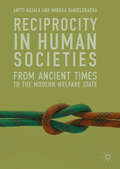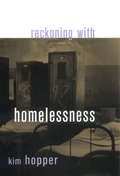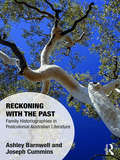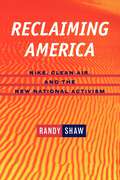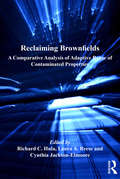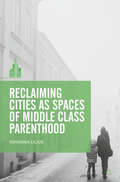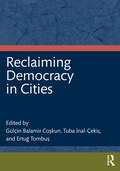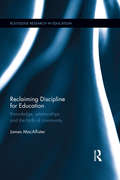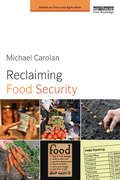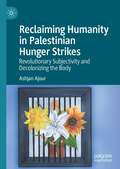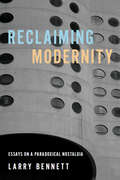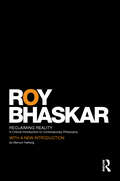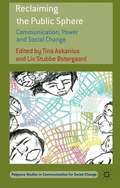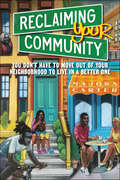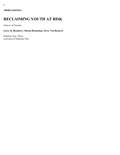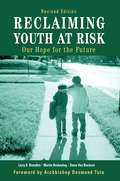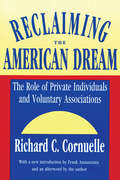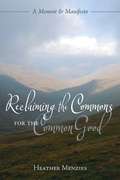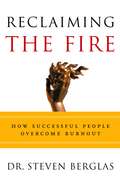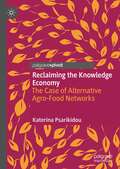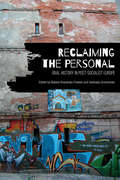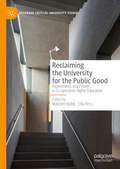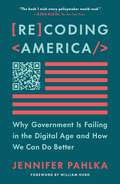- Table View
- List View
Reciprocity in Human Societies: From Ancient Times to the Modern Welfare State
by Antti Kujala Mirkka DanielsbackaPresenting new insights into reciprocity, this book combines Marcel Mauss’s well-known gift theory with Barrington Moore’s idea of mutual obligations linking rulers and the ruled. Teasing out the interrelatedness of these approaches, Reciprocity in Human Societies suggests that evolutionary psychology reveals a human tendency for reciprocity and collaboration, not only in a mutually cooperative way but also through increasing retributive moral emotions. The book discusses various historical societies and the different models of the current welfare state—Nordic (social democratic), conservative, and liberal— and the repercussions of the neoliberal policies of tax havens, tax cuts, and austerity with a cross-disciplinary approach that bridges evolutionary psychology, sociology, and social anthropology with history.
Reckoning with Homelessness
by Kim Hopper"It must be some kind of experiment or something, to see how long people can live without food, without shelter, without security."--Homeless woman in Grand Central StationKim Hopper has dedicated his career to trying to address the problem of homelessness in the United States. In this powerful book, he draws upon his dual strengths as anthropologist and advocate to provide a deeper understanding of the roots of homelessness. He also investigates the complex attitudes brought to bear on the issue since his pioneering fieldwork with Ellen Baxter twenty years ago helped put homelessness on the public agenda.Beginning with his own introduction to the problem in New York, Hopper uses ethnography, literature, history, and activism to place homelessness into historical context and to trace the process by which homelessness came to be recognized as an issue. He tells the largely neglected story of homelessness among African Americans and vividly portrays various sites of public homelessness, such as airports. His accounts of life on the streets make for powerful reading.
Reckoning with the Past: Family Historiographies in Postcolonial Australian Literature (Memory Studies: Global Constellations)
by Joseph Cummins Ashley BarnwellThis is the first book to examine how Australian fiction writers draw on family histories to reckon with the nation’s colonial past. Located at the intersection of literature, history, and sociology, it explores the relationships between family storytelling, memory, and postcolonial identity. With attention to the political potential of family histories, Reckoning with the Past argues that authors’ often autobiographical works enable us to uncover, confront, and revise national mythologies. An important contribution to the emerging global conversation about multidirectional memory and the need to attend to the effects of colonisation, this book will appeal to an interdisciplinary field of scholarly readers.
Reclaiming America: Nike, Clean Air, and the New National Activism
by Randy ShawHave activists taken the bumper-sticker adage "Think Globally, Act Locally" too literally? Randy Shaw argues that they have, with destructive consequences for America. Since the 1970s, activist participation in national struggles has steadily given way to a nearly exclusive focus on local issues. America's political and corporate elite has succeeded in controlling the national agenda, while their adversaries—the citizen activists and organizations who spent decades building federal programs to reflect the country's progressive ideals—increasingly bypass national fights. The result has been not only the dismantling of hard-won federal programs but also the sabotaging of local agendas and community instituions by decisions made in the national arena.Shaw urges activists and their organizations to implement a "new national activism" by channeling energy from closely knit local groups into broader causes. Such activism enables locally oriented activists to shape America's future and work on national fights without traveling to Washington, D.C., but instead working in their own backyards. Focusing on the David and Goliath struggle between Nike and grassroots activists critical of the company's overseas labor practices, Shaw shows how national activism can rewrite the supposedly ironclad rules of the global economy by ensuring fair wages and decent living standards for workers at home and abroad. Similarly, the recent struggles for stronger clean air standards and new federal budget priorities demonstrate the potential grassroots national activism to overcome the corporate and moneyed interests that increasingly dictate America's future.Reclaiming America's final section describes how community-based nonprofit organizations, the media, and the Internet are critical resources for building national activism. Shaw declares that community-based groups can and must combine their service work with national grassroots advocacy. He also describes how activists can use public relations to win attention in today's sprawling media environment, and he details the movement-building potential of e-mail. All these resources are essential for activists and their organizations to reclaim America's progressive ideals.
Reclaiming American Virtue: The Human Rights Revolution of the 1970s
by Barbara J. KeysThe American commitment to international human rights emerged in the 1970s not as a logical outgrowth of American idealism but as a surprising response to national trauma, as Barbara Keys shows in this provocative history. Reclaiming American Virtue situates this novel enthusiasm as a reaction to the profound challenge of the Vietnam War and its tumultuous aftermath. Instead of looking inward for renewal, Americans on the right and the left alike looked outward for ways to restore America's moral leadership. Conservatives took up the language of Soviet dissidents to resuscitate a Cold War narrative that pitted a virtuous United States against the evils of communism. Liberals sought moral cleansing by dissociating the United States from foreign malefactors, spotlighting abuses such as torture in Chile, South Korea, and other right-wing allies. When Jimmy Carter in 1977 made human rights a central tenet of American foreign policy, his administration struggled to reconcile these conflicting visions. Yet liberals and conservatives both saw human rights as a way of moving from guilt to pride. Less a critique of American power than a rehabilitation of it, human rights functioned for Americans as a sleight of hand that occluded from view much of America's recent past and confined the lessons of Vietnam to narrow parameters. It would be a small step from world's judge to world's policeman, and American intervention in the name of human rights would be a cause both liberals and conservatives could embrace.
Reclaiming Brownfields: A Comparative Analysis of Adaptive Reuse of Contaminated Properties (Global Urban Studies)
by Richard C. HulaThe environmental legacy of past industrial and agricultural development can simultaneously pose serious threats to human health and impede reuse of contaminated land. The urban landscape around the world is littered with sites contaminated with a variety of toxins produced by past use. Both public and private sector actors are often reluctant to make significant investments in properties that simultaneously pose significant potential human health issues, and may demand complex and very expensive cleanups. The chapters in this volume recognize that land and water contamination are now almost universally acknowledged to be key social, economic, and political issues. How multiple societies have attempted to craft and implement public policy to deal with these issues provides the central focus of the book. The volume is unique in that it provides a global comparative perspective on brownfield policy and examples of its use in a variety of countries.
Reclaiming Cities as Spaces of Middle Class Parenthood (The Contemporary City)
by Johanna LiliusFor nearly a century families have been out-migrating to suburbs and peri-urban areas. In this book, Johanna Lilius conceptualizes the relatively recent phenomenon of families choosing to live in the inner city. Drawing on a range of qualitative data, the book offers a holistic approach to simultaneously understanding changes within parenting practices and changes connected to city development. The book explains not only why families choose to stay in the inner city and how they use the city in their everyday lives, but also how families change the landscape of contemporary cities, and how the family is, and has been, perceived in urban planning and policy-making. The Nordic perspective provided by Lilius makes this book an important contribution in helping understand inner city change outside the Anglo-American context, and will appeal to an international audience.
Reclaiming Democracy in Cities
by Gülçin Balamir Coşkun Tuba İnal-Çekiç Ertuğ TombuşEffective urban governance is essential in responding to the challenges of inequality, migration, public health, housing, security, and climate change. Reclaiming Democracy in Cities frames the city as a political actor in its own right, exploring the city’s potential to develop deliberative and participatory practices which help inform innovative democratic solutions to modern day challenges.Bringing together expertise from an international selection of scholars from various fields, this book begins with three chapters which discuss the theoretical idea of the democratic city and the real-world applicability of such a model. Part II discusses new and innovative democratic practices at the local level and asks in what way these practices help us to rethink democratic politics, institutions, and mechanisms in order to move toward a more egalitarian, pluralist, and inclusive direction. Drawing on the Istanbul municipal elections and the Kurdish municipal experience, Part III focuses on the question of whether cities and local governments can lead to the emergence of strong democratic forces that oppose authoritarian regimes. Finally, Part IV discusses urban solidarity networks and collaborations at both the local level and beyond the nation, questioning whether urban solidarity networks and alliances with civil society or transnational city networks can create alternative ways of thinking about the city as a locus of democracy.This edited volume will appeal to academics, researchers, and advanced students in the fields of urban studies, particularly those with an interest in democratic theory; local democracy; participation and municipalities. It will also be relevant for practitioners of local governments, NGOs, and advocacy groups and activists working for solidarity networks between cities.
Reclaiming Discipline for Education: Knowledge, relationships and the birth of community (Routledge Research in Education)
by James MacAllisterDiscipline is of profound educational importance, both inside educational institutions and outside of them in personal and social life. Reclaiming Discipline for Education revisits neglected philosophical ideas about discipline in education and uses these ideas to re-think practices and discourses of discipline in education today. Chapters in this book trace the evolution of thought regarding discipline in education all the way from Kant through to Durkheim, Foucault, Peters, Dewey and Macmurray. MacAllister also critically examines the strengths and weaknesses of contemporary school discipline practices in the UK, the US and Australia, including behaviour management, zero tolerance and restorative approaches. The educational credentials of psychological constructs of grit and self-discipline are also questioned. This book concludes by considering the current and future state of discipline in education on the basis of the different philosophical, practical and policy perspectives discussed. In particular, MacAllister examines why it is problematic to consider practices of discipline in isolation from the wider purposes of education. This book is suitable for an international audience and should be read by anyone who is interested in education and educational leadership, as well as those interested in the philosophy of education.
Reclaiming Food Security (Earthscan Food and Agriculture)
by Michael S. CarolanIn this challenging work, the author argues that the goal of any food system should not simply be to provide the cheapest calories possible. A secure food system is one that affords people and nations – in both the present and future – the capabilities to prosper and lead long, happy, and healthy lives. For a variety of reasons, food security has come to be synonymous with cheap calorie security. On this measure, the last fifty years have been a remarkable success. But the author shows that these cheap calories have also come at great cost, to the environment, individual and societal well-being, human health, and the food sovereignty of nations. The book begins by reviewing the concept of food security, particularly as it has been enacted within agrifood and international policy over the last century. After proposing a coherent definition the author then assesses empirically whether these policies have actually made us and the environment any better off. One of the many ways the author accomplishes this task is by introducing the Food and Human Security Index (FHSI) in an original attempt to better measure and quantify the affording qualities of food systems. A FHSI score is calculated for 126 countries based on indicators of objective and subjective well-being, nutrition, ecological sustainability, food dependency, and food system market concentration. The final FHSI ranking produces many counter-intuitive results. Why, for example, does Costa Rica top the ranking, while the United States comes in at number fifty-five? The author concludes by arguing for the need to reclaim food security by returning the concept to something akin to its original spirit, identified earlier in the book. While starting at the level of the farm the concluding chapter focuses most of its attention beyond the farm gate, recognizing that food security is more than just about issues surrounding production. For example, space is made in this chapter to address the important question of, "What can we eat if not GDP?" We need, the author contends, a thoroughly sociological rendering of food security: a position that views food security not as a thing – or an end in itself – but as a process that ought to make people and the Planet better off.
Reclaiming Humanity in Palestinian Hunger Strikes: Revolutionary Subjectivity and Decolonizing the Body
by Ashjan AjourRooted in feminist ethnography and decolonial feminist theory, this book explores the subjectivity of Palestinian hunger strikers in Israeli prisons, as shaped by resistance. Ashjan Ajour examines how these prisoners use their bodies in anti-colonial resistance; what determines this mode of radical struggle; the meanings they ascribe to their actions; and how they constitute their subjectivity while undergoing extreme bodily pain and starvation. These hunger strikes, which embody decolonisation and liberation politics, frame the post-Oslo period in the wake of the decline of the national struggle against settler-colonialism and the fragmentation of the Palestinian movement. Providing narrative and analytical insights into embodied resistance and tracing the formation of revolutionary subjectivity, the book sheds light on the participants’ views of the hunger strike, as they move beyond customary understandings of the political into the realm of the ‘spiritualisation’ of struggle. Drawing on Foucault’s conception of the technologies of the self, Fanon’s writings on anti-colonial violence, and Badiou’s militant philosophy, Ajour problematises these concepts from the vantage point of the Palestinian hunger strike.
Reclaiming Modernity: Essays on a Paradoxical Nostalgia
by Larry BennettWhy do we seek to return to the past or rescue pieces of the past that may have value in the present? Why does nostalgia attach to an approach to the world, social rules, and material products that willfully rejected the past? Larry Bennett explores the complexities of nostalgia with considerations of the historic preservation of brutalist architecture, specifically Bertrand Goldberg’s Prentice Women’s Hospital in Chicago; the memoirs and recollections of early and mid-twentieth-century Brooklyn and Detroit; and the turntable’s rebirth as a musical instrument alongside the vinyl LP’s resurgence as a prized way of consuming music. Bennett tracks modernity as expressed through ideas, artistic products, and widespread social practices. His consideration of nostalgia focuses on our inclination to rediscover value in people, places, and social habits diminished by the passage of time. Provocative and multidisciplinary, Reclaiming Modernity delves into the paradox of how we feel nostalgia for ideas and times that emerged from an impulse to shun nostalgia.
Reclaiming Reality: A Critical Introduction to Contemporary Philosophy (Classical Texts in Critical Realism (Routledge Critical Realism))
by Roy BhaskarOriginally published in 1989, Reclaiming Reality still provides the most accessible introduction to the increasingly influential multi-disciplinary and international body of thought, known as critical realism. It is designed to "underlabour" both for the sciences, especially the human sciences, and for the projects of human emancipation which such sciences may come to inform; and provides an enlightening intervention in current debates about realism and relativism, positivism and poststucturalism, modernism and postmodernism, etc. Elaborating his critical realist perspective on society, nature, science and philosophy itself, Roy Bhaskar shows how this perspective can be used to undermine currently fashionable ideologies of the Right, and at the same time, to clear the ground for a reinvigorated Left. Reclaiming Reality contains powerful critiques of some of the most important schools of thought and thinkers of recent years—from Bachelard and Feyerabend to Rorty and Habermas; and it advances novel and convincing resolutions of many traditional philosophical problems. Now with a new introduction from Mervyn Hartwig, this book continues to provide a straightforward and stimulating introduction to current debates in philosophy and social theory for the interested lay reader and student alike. Reclaiming Reality will be of particular value not only for critical realists but for all those concerned with the revitalization of the socialist emancipatory project and the renaissance of the Marxist theoretical tradition. Roy Bhaskar is the originator of the philosophy of critical realism, and the author of many acclaimed and influential works including A Realist Theory of Science, The Possibility of Naturalism, Scientific Realism and Human Emancipation and Dialectic: The Pulse of Freedom. He is an editor of the recently published Critical Realism: Essential Readings and is currently chair of the Centre for Critical Realism.
Reclaiming The Public Sphere: Communication, Power and Social Change
by Tina Askaniusi Liv Stubbe ØstergaardThis volume brings together a range of different specialists in the arts and cultural industries, as well as international academics and public intellectuals, to explore how media and communication practices for social change are currently being reconfigured in both conceptual and rhetorical terms.
Reclaiming Your Community: You Don’t Have to Move out of Your Neighborhood to Live in a Better One
by Majora CarterMajora Carter shows how brain drain cripples low-status communities and maps out a development strategy focused on talent retention to help them break out of economic stagnation. "My musical, In the Heights, explores issues of community, gentrification, identity and home, and the question: Are happy endings only ones that involve getting out of your neighborhood to achieve your dreams? In her refreshing new book, Majora Carter writes about these issues with great insight and clarity, asking us to re-examine our notions of what community development is and how we invest in the futures of our hometowns. This is an exciting conversation worth joining.” —Lin-Manuel Miranda How can we solve the problem of persistent poverty in low-status communities? Majora Carter argues that these areas need a talent-retention strategy, just like the ones companies have. Retaining homegrown talent is a critical part of creating a strong local economy that can resist gentrification. But too many people born in low-status communities measure their success by how far away from them they can get. Carter, who could have been one of them, returned to the South Bronx and devised a development strategy rooted in the conviction that these communities have the resources within themselves to succeed. She advocates measures such as • Building mixed-income instead of exclusively low-income housing to create a diverse and robust economic ecosystem • Showing homeowners how to maximize the long-term value of their property so they won't succumb to quick-cash offers from speculators • Keeping people and dollars in the community by developing vibrant “third spaces”—restaurants, bookstores, and places like Carter's own Boogie Down Grind Cafe This is a profoundly personal book. Carter writes about her brother's murder, how turning a local dumping ground into an award-winning park opened her eyes to the hidden potential in her community, her struggles as a woman of color confronting the “male and pale” real estate and nonprofit establishments, and much more. It is a powerful rethinking of poverty, economic development, and the meaning of success.
Reclaiming Youth At Risk: Futures Of Promise (reach Alienated Youth And Break The Conflict Cycle Using The Circle Of Courage)
by Larry K. Brendtro Martin Brokenleg Steve Van BockernEmpower your alienated students to cultivate a deep sense of belonging, mastery, independence, and generosity. This fully updated edition of Reclaiming Youth at Risk by Larry K. Brendtro, Martin Brokenleg, and Steve Van Bockern merges Native American knowledge and Western science to create a unique alternative for reaching disconnected or troubled youth. Rely on the book's new neuroscience research, insights, and examples to help you establish positive relationships, foster social learning and emotional development, and inspire every young person to thrive and overcome. Drive positive youth development with the updated Reclaiming Youth at Risk: Study the four hazards that dominate the lives of youth at risk: relational trauma, failure as futility, powerlessness, and loss of purpose. Learn how cultivating the Circle of Courage values of belonging, mastery, independence, and generosity can combat the four hazards. Explore a unique strength-based approach for reclaiming discouraged or alienated youth. Understand how to create a safe, brain-friendly learning environment and break the conflict cycle. Read personal accounts of individuals who have transformed student trauma into student resilience in schools through trauma-informed practice.
Reclaiming Youth at Risk: Our Hope for the Future
by Larry K. Brendtro Martin Brokenleg Steven Van BockernA balance of wisdom drawn from Native American philosophies and Western psychology, this book offers a unique perspective for connecting with troubled students. It challenges educators to see youth at risk through new eyes and offers compelling, concrete alternatives for reclaiming them.
Reclaiming the American Dream: The Role of Private Individuals and Voluntary Associations (Philanthropy And Society Ser.)
by Richard C. CornuelleThis book was the first to sketch the full dimensions of the nation's voluntary sector, give it a name (the independent sector), explain its unfamiliar metabolism, and imagine its enormous unused potential for defining the central problems of an industrial society accurately and acting on them effectively. Upon publication, George Gallup said the book has sparked "the most dramatic shift in American thinking since the New Deal."
Reclaiming the Commons for the Common Good
by Heather MenziesCommoning was a way of life for most of our ancestors. In Reclaiming the Commons for the Common Good, author Heather Menzies journeys to her roots in the Scottish Highlands, where her family lived in direct relation with the land since before recorded time.Beginning with an intimate account of unearthing the heritage of the commons and the real tragedy of its loss, Menzies offers a detailed description of the self-organizing, self-governing, and self-informing principles of this nearly forgotten way of life, including its spiritual practices and traditions. She then identifies pivotal commons practices that could be usefully revived today. A final "manifesto" section pulls these facets together into a unified vision for reclaiming the commons, drawing a number of current popular initiatives into the commoning frame, such as local food security, permaculture, and the Occupy Movement.An engaging memoir of personal and political discovery, Reclaiming the Commons for the Common Good combines moving reflections on our common heritage with a contemporary call to action, individually and collectively; locally and globally. Readers will be inspired by the book's vision of reviving the commons ethos of empathy and mutual respect, and energized by her practical suggestions for connection people and place for the common good.Heather Menzies is an award-winning writer and scholar and member of the Order of Canada. She is the author of nine books, including Whose Brave New World? and No Time.
Reclaiming the Fire: How Successful People Overcome Burnout
by Steven BerglasThe definitive work on avoiding burnout, written by the psychologist who is the leading specialist on the issue. An illuminating and useful book for anyone coping with the pressures of work.In Reclaiming the Fire, Dr. Steven Berglas analyzes the rises and falls of corporate executives, middle managers, lawyers, entrepreneurs, and others as they struggle to handle the trappings of successful careers. How does one deal with encore anxiety, the monotony of having to use talents that are no longer psychologically rewarding? Why is it that our national obsession with wealth traps people in careers that often lead them to wonder, "Is that all there is?" And why do highly successful people often set themselves up for disastrous falls?Dr. Berglas answers all these questions and many more in this groundbreaking book by discussing real people whose careers have left them feeling pressured, burdened, and jaded.In his most progressive and striking contribution to the literature on career success, Dr. Berglas debunks the persistent myth that women suffer more stress and burnout than men. He disproves the common claim that women involved both in careers and in family life suffer from trying to have it all, and he demonstrates how the drive to form close interpersonal ties a drive that is intrinsic to women can actually prevent both men and women from experiencing burnout. In a related analysis of the mentoring process, Dr. Berglas shows why it is more important for careerists to build legacies for future generations (a process he terms generativity) than to become obsessed with their own personal success. He proves that the process not only benefits the student but provides the mentor with psychological satisfaction and even improved physical health.Reclaiming the Fire uses the working world not the psychiatric couch as a venue for understanding the psychological and emotional burdens of success. It is the first comprehensive account of how to balance self-esteem and ambition while maintaining challenge and stimulation throughout your career. Reclaiming the Fire provides insight into: * Why baby boomers are currently suffering an epidemic of career dissatisfaction * Why women are uniquely suited to cope with the pressures that cause men to suffer burnout, and what men can learn from them * How to escape golden handcuffs: the workaholic devotion to a job that is no longer emotionally satisfying * How to cope with anger that threatens to sabotage your career * How all professionals can identify the passions that will allow them to sustain and enjoy success throughout their lives.
Reclaiming the Knowledge Economy: The Case of Alternative Agro-Food Networks
by Katerina PsarikidouThis book offers a critical analysis of the diverse knowledge and knowledge production processes through which ‘alternative agro-food networks’ can constitute a more plural ‘knowledge economy’. It provides critical sociological and political economic insights that help problematise dominant capitalocentric and technocentric framings of the ‘knowledge (bio)economy’. It will appeal to researchers, practitioners and policy-makers with an interest in supporting inclusive research, policy and innovation agendas for sustainability.
Reclaiming the Personal
by Natalia Khanenko-Friesen Gelinada GrinchenkoThe first twenty-five years of life in post-socialist Europe have seen vast political, economic, and cultural changes, as societies that lived under communist rule struggle with the traumas of the past and the challenges of the future. In this context, oral history has acquired a unique role in understanding the politics of memory and the practice of history.Drawing on research conducted in Belarus, Germany, Poland, Russia, and Ukraine, Reclaiming the Personal introduces theory and practice in this vital and distinctive area to a global audience. Focusing on issues such as repressed memories of the Second World War, the economic challenges of late socialism, and the experience of the early post-socialist transition, the essays underscore the political implications of oral history research in post-socialist Europe and highlight how oral history research in the region differs from that being conducted elsewhere.
Reclaiming the Road: Mobility Justice beyond Complete Streets
by David L PrytherchImagining equitable streets for all For the past century, our roadways have been engineered as pipes for cars, but they offer vast potential as public spaces. From New York and Boston to Portland and Los Angeles, cities are rethinking their streets, going beyond sidewalks and bike lanes to welcome nonmotorists to share the asphalt roadway. Reclaiming the Road traces the historical evolution of America&’s streets and explores contemporary movements to retake them from cars—temporarily and permanently—for diverse forms of mobility and community life. To share the street raises important questions of equity, in transportation and beyond. David L. Prytherch proposes a bold, intersectional vision of a more just street. Reclaiming the Road connects cutting-edge theory, policy analysis, and firsthand accounts from those leading the charge in transforming our streets to advocate for changing how we think about and design roads. Prytherch features case studies of nine major cities in the United States to show how experiments in reclaiming streets accelerated during the Covid-19 pandemic to become lasting changes. Through in-depth interviews, he shares stories of how planners, transportation advocates, and community leaders have implemented innovative programs for slowing neighborhood streets, opening roads for walking and biking, and reconstructing roadways with public parklets and street plazas as social spaces for curbside conversation. Examining movements to transform streets through the lenses of equity and justice, Reclaiming the Road tackles the conceptual challenge of defining mobility justice and the practicalities of planning a more just public street, offering a compelling vision for the future of America&’s public spaces. Retail e-book files for this title are screen-reader friendly with images accompanied by short alt text and/or extended descriptions.
Reclaiming the University for the Public Good: Experiments and Futures in Co-operative Higher Education (Palgrave Critical University Studies)
by Malcolm Noble Cilla RossThis book asks how we can reclaim the university for the public good. The editors and contributors argue that the sector is in crisis, accelerated by the passing of the UK Higher Education Research Act in 2017 and made visible during the University and College Union strikes in April 2018. In response to this, there are widespread demands to reclaim the university and protect education as a public good, using co-operative structures. Taking an interdisciplinary and social justice perspective, the editors and contributors offer concrete examples of alternative higher education: in doing so, analysing how the future of the university can be recovered. This intersectional volume discusses a broad range of approaches to higher education while disseminating new ideas. It will be of interest and value to those disenchanted with the current state of higher education in the UK and beyond, as well as activists and policy makers.
Recoding America: Why Government Is Failing in the Digital Age and How We Can Do Better
by Jennifer PahlkaNamed one of NPR's Best Books of 2023Named one of Ezra Klein's "Books That Explain Where We Are in 2023," The New York TimesLearn more about Jennifer Pahlka's work at recodingamerica.us. “The book I wish every policymaker would read.”—Ezra Klein, The New York TimesA bold call to reexamine how our government operates—and sometimes fails to—from President Obama’s former deputy chief technology officer and the founder of Code for AmericaJust when we most need our government to work—to decarbonize our infrastructure and economy, to help the vulnerable through a pandemic, to defend ourselves against global threats—it is faltering. Government at all levels has limped into the digital age, offering online services that can feel even more cumbersome than the paperwork that preceded them and widening the gap between the policy outcomes we intend and what we get.But it’s not more money or more tech we need. Government is hamstrung by a rigid, industrial-era culture, in which elites dictate policy from on high, disconnected from and too often disdainful of the details of implementation. Lofty goals morph unrecognizably as they cascade through a complex hierarchy. But there is an approach taking hold that keeps pace with today’s world and reclaims government for the people it is supposed to serve. Jennifer Pahlka shows why we must stop trying to move the government we have today onto new technology and instead consider what it would mean to truly recode American government.
